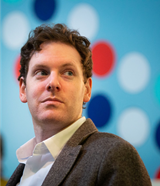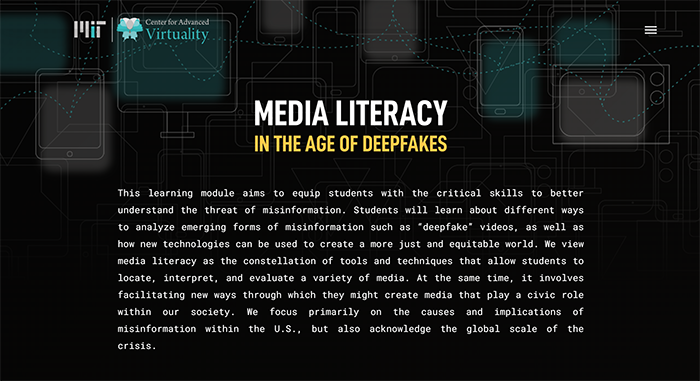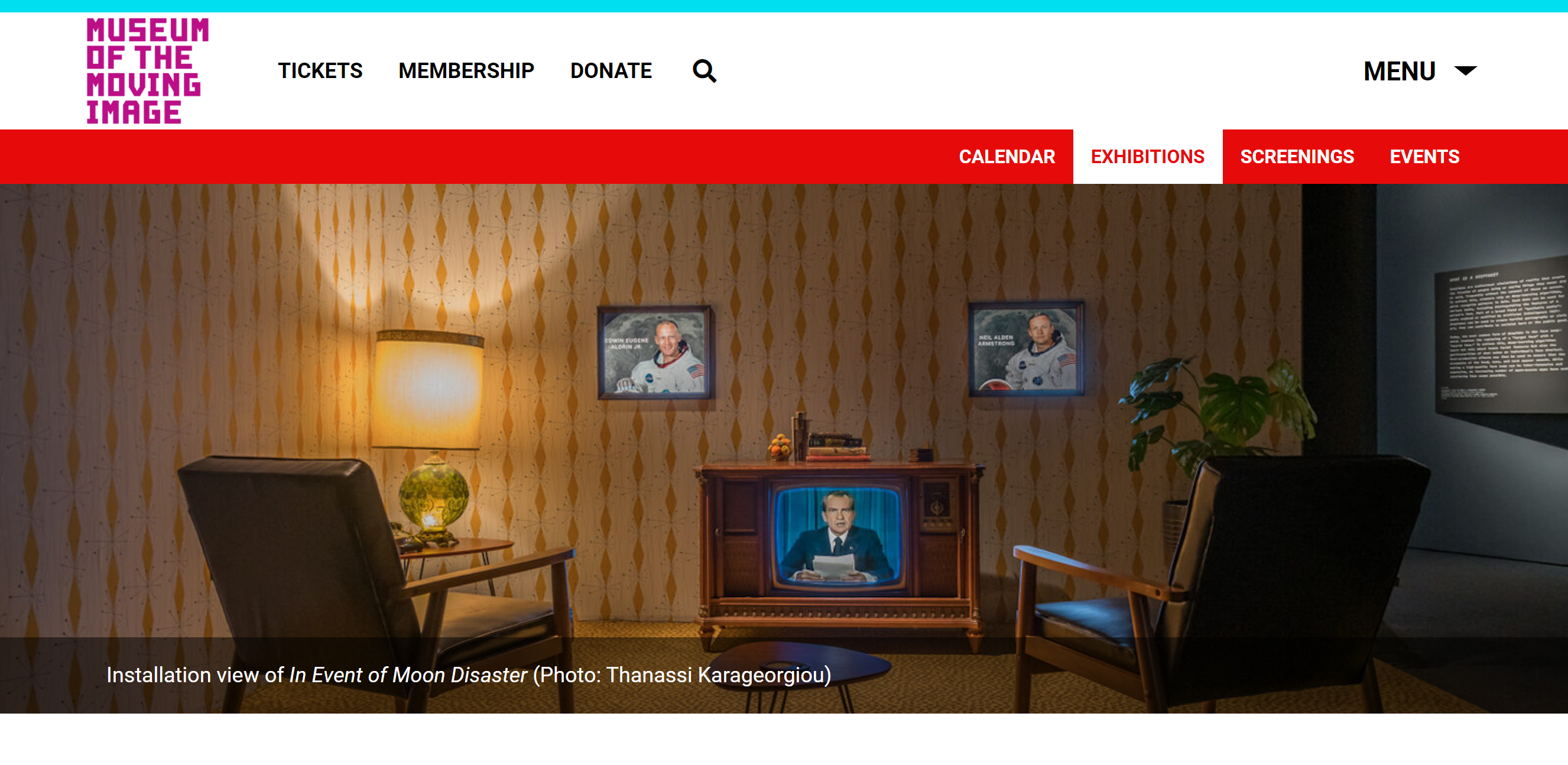 CONWAY, Ark. (January 20,
2022) — Dr. Joshua Glick wants you (and everyone else) to know that seeing
shouldn’t always be believing.
CONWAY, Ark. (January 20,
2022) — Dr. Joshua Glick wants you (and everyone else) to know that seeing
shouldn’t always be believing.
Glick, the Isabelle
Peregrin Odyssey Assistant Professor of English-Film and Media Studies at
Hendrix College and a Fellow at the Massachusetts Institute of Technology (MIT),
designed “Media Literacy in the Age
of Deepfakes.”
Created in collaboration with colleagues in MIT’s Center for Advanced
Virtuality and hosted through OpenCourseWare, the open access online course is available
for free to anyone with an internet connection.
Building on this project,
Glick also co-curated with Barbara Miller an exhibition currently on display at
the Museum of the Moving Image (MoMI) in New York City: Deepfake: Unstable
Evidence on Screen.
The show will run through May 15, 2022.
Cultivating Media
Literacy
The course, available at https://deepfakes.virtuality.mit.edu, teaches students and educators about the
history of media manipulation, the rise of “deepfake” videos, and some civic
applications of emerging technology. Importantly, individual course modules aim
to teach digital media literacy, which includes sharing tools and techniques
for combatting the spread of misinformation.
 Glick’s teaching and
civic engagement work at Hendrix directly connects to this material. English
majors recently enjoyed his Fall 2021 course, Media in the Age of Fake News,
a seminar that contributes to the media studies facet of the department’s
degree program.
Glick’s teaching and
civic engagement work at Hendrix directly connects to this material. English
majors recently enjoyed his Fall 2021 course, Media in the Age of Fake News,
a seminar that contributes to the media studies facet of the department’s
degree program.
“The course engages with this
urgent topic from a few different angles,” Glick said, noting that everyone
from journalists, to technologists, public policy experts, and everyday
citizens are interested in these issues. “First, we take a deep dive into the
history of misinformation, then some of the recent forms we’re seeing, and
finally a discussion of what we can do to fight back.”
The online course
involves a suite of three modules and lots of educational resources. “The
project provided the R&D to both create new in-person courses and
incorporate new units in classes such as Contemporary Documentary and Intro
to Film Studies,” Glick said. “It has also given me ideas for future
Project Pericles events and more public-facing writing. And I love how what we
talk about in the classroom can live on and benefit a larger community.”
The course can be
completed in as little or as much time as the user chooses to engage. While a
teacher may choose to assign a module as a long-form homework assignment, they
could also use it as a launch point for an entire course.
Exhibition Demonstrates
Danger of Deepfakes
With advances in machine-learning
technology enabling the creation of deepfakes, it has never been more difficult
to separate fact from fiction and truth from illusion on screen. Deepfake
videos draw on artificial intelligence (AI) to simulate people saying or doing
things they never said or did. With social media enabling the sharing of moving
images with large segments of the population in ever-shorter periods of time, deepfakes
are more immediately believed or contested based on the viewer’s entrenched perspective.
 Deepfake: Unstable
Evidence on Screen
demonstrates the instability of on-screen truths, and places them in a
historical continuum from the late 19th through the early 21st centuries.
Deepfake: Unstable
Evidence on Screen
demonstrates the instability of on-screen truths, and places them in a
historical continuum from the late 19th through the early 21st centuries.
The centerpiece of the
exhibition is In Event of Moon Disaster, a deepfake art installation co-directed
by Francesca Panetta and Halsey Burgund that uses AI technology to suppose an
alternate history of the Apollo 11 mission, presented on a television set in a
period living room. Glick was the Education Producer for In Event of Moon
Disaster, an MIT Center for Advanced Virtuality production that won an Emmy
Award for Outstanding Interactive Media in 2021.
To organize the
exhibition, Glick worked with Barbara Miller, MoMI’s deputy director for curatorial
affairs. “This has been such a rewarding experience. Given everything that’s
happening in the U.S. and around the world, it’s important that people have a
critical understanding of both the peril as well as progressive possibilities
of emerging technology. Teaching in a liberal arts environment really propelled
this work forward and facilitated my collaboration with the museum. In turn,
I’m excited to bring students to the show (covid permitting) and to continue to
incorporate what I’m learning into the flow of my classes.”
About Joshua Glick
Joshua Glick joined the
Hendrix College faculty in 2015. He holds a Ph.D. in Film & Media Studies
and American Studies from Yale University. His research and teaching explore
global documentary, critical race studies, emerging media, and Hollywood as an
evolving form of industrial and artistic production. Glick is currently writing
a book that examines how the post-1989 rise of neoliberalism and seismic shifts
in the media industries galvanized an interest in documentary on both the left
and right of the political spectrum. In collaboration with Patricia
Aufderheide, he is also co-editing the Oxford Handbook of Documentary, which brings
scholars and practitioners into dialogue about the ethics and craft of social
justice filmmaking.
Glick’s filmmaking and
public humanities projects involve collaborating with archives, museums, and
community media organizations. He served as the moving image curator for the NEH-funded
exhibition, Coney Island: Visions of an American Dreamland, 1861-2008.
About Hendrix College
A private liberal arts
college in Conway, Arkansas, Hendrix College consistently earns recognition as
one of the country’s leading liberal arts institutions and is featured in Colleges
That Change Lives: 40 Schools That Will Change the Way You Think About Colleges.
Its academic quality and rigor, innovation, and value have established Hendrix
as a fixture in numerous college guides, lists, and rankings. Founded in 1876,
Hendrix has been affiliated with the United Methodist Church since 1884. To
learn more, visit www.hendrix.edu.